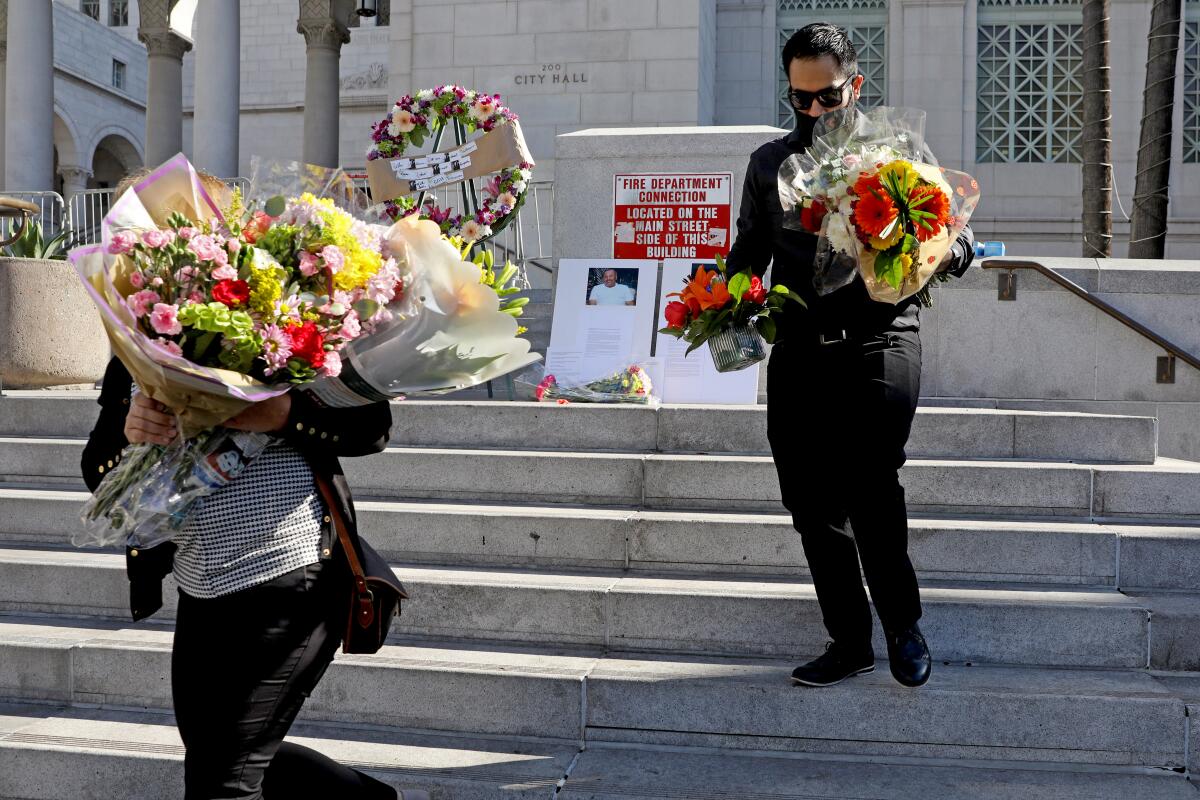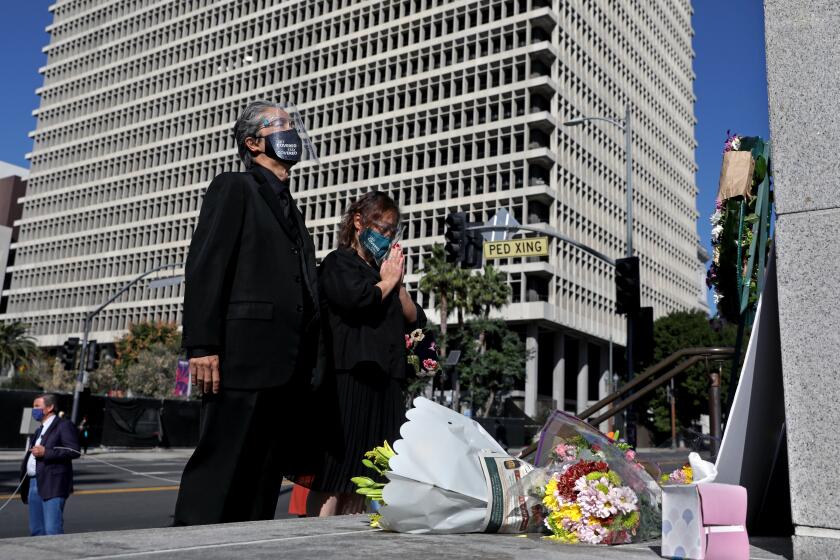Lawsuit seeks to limit in-person L.A. County civil trials because of COVID-19 risk

- Share via
A number of public interest attorneys filed a lawsuit Tuesday seeking to halt in-person traffic and eviction trials held in Los Angeles County, claiming COVID-19 prevention protocols are failing after two court interpreters who were infected died in recent weeks.
The suit, brought by Public Counsel,the Inner City Law Center,Legal Aid Foundation of Los Angeles
and Neighborhood Legal Services of Los Angeles County, accuses the courts of prioritizing the “continuity of nonessential operations over community safety and human life.”
“The court’s facilities are built and administered in a way that makes it impossible to maintain a safe social distance of six feet or more, particularly within crowded and poorly ventilated courtrooms and hallways. Every day, hundreds of Angelenos crowd into the county’s courthouses to enter pleas on traffic tickets or defend against eviction lawsuits,” the suit read. “Public health experts have determined that not only are these conditions unsafe and likely to result in transmission of the virus, they are ripe for a ‘superspreader’ event.”
The deaths of the court interpreters — Sergio Cafaro, 56, and Daniel Felix, 66 — have infuriated court staff and attorneys, many of whom have been critical of the court system’s handling of the pandemic.
The Los Angeles County Superior Court system is still holding in-person hearings despite the recent deaths of three court employees from COVID-19.
The interpreters were among three court employees who died in January after testing positive for the coronavirus; a public defender also died of COVID-19 last year. More than 200 employees of the public defender’s and district attorney’s offices have tested positive for the virus. Within the L.A. County Sheriff’s Department, which staffs the county’s jails and courtrooms, more than 2,800 employees have tested positive.
At least 445 of the court’s 5,100 employees and judges have tested positive since March, according to court spokeswoman Ann Donlan. The court’s infection rate, however, is about 1.4% lower than the countywide rate, she previously told The Times.
In a statement issued late Tuesday, Donlan said she couldn’t comment on pending litigation but anticipated “that all matters brought by litigants each day across this county will be heard safely and fairly because of our commitment to equal access to justice.”
The suit argues that traffic and eviction hearings are not only unnecessary, but also disproportionately affect impoverished L.A. County residents and communities of color.
By continuing eviction hearings, lawyers say, the courts are putting defendants at risk of not just COVID-19 infection, but also homelessness, in cases that often stem from what they describe as “trumped-up” allegations brought by landlords. In the case of traffic hearings, the suit alleges the courts are violating the equal protection clause of the U.S. Constitution by making impoverished defendants come to court to fight traffic citations, while wealthier defendants who can simply afford to pay fines face significantly lesser risk.
The courts shuttered for several days in March, the same week the pandemic evolved into a global crisis, and criminal trials have been largely stalled in the last year. While court officials have taken a number of measures to try to safeguard facilities from becoming havens for viral spread — including installing plexiglass shields in courtrooms to separate attorneys, drastically limiting public access to the courts and broadening remote access systems — the suit alleges the precautions do not go nearly far enough.
Echoing criticisms raised by many attorneys working in the L.A. County courts, the suit alleges judges and sheriff’s deputies have been incredibly lax in enforcing rules regarding masks, distancing or even how many people are supposed to fill the often crowded elevators inside courthouses. Court officials have also steadfastly refused to screen people entering the courts or conduct temperature checks, despite numerous reports of coronavirus-positive defendants, litigants and police officers walking into courtrooms.
“The court’s motto since the onset of the pandemic has been ‘Here for you, safe for you,’” said Trinidad Ocampo, an attorney with Neighborhood Legal Services of Los Angeles. “Yet, I know that appearing in court is like playing Russian roulette.”
Ocampo also said the court’s remote access platforms have proved extremely difficult to use for older clients, as well as those who speak poor English or struggle with internet literacy, leaving many of her most at-risk clients stuck choosing between their health or the likelihood that they will lose their case unless they appear in person.
In the suit, Public Counsel also questioned how the courts could be safe for others if Presiding Judge Eric Taylor called on health officials to give judges, court staff and other attorneys priority access to the COVID-19 vaccine last month.
Diego Cartagena, the president and CEO of Bet Tzedek, a legal aid foundation, said in an interview that many of his organization’s board members, some of whom work in federal courts or other quarters of the county system, were shocked to hear traffic and eviction cases were still being heard in-person.
“Everything has moved remotely and they don’t face this,” Cartagena said.
“We have attorneys reporting to us that the courthouse and courtrooms are packed. There are so many people in unlawful detainer court that it is practically impossible to practice social distancing,” he said. “There are fixes to this. Superior Court systems in other parts of California have managed to move to remote appearances. This idea that it can’t be done or is too difficult to be done is not accurate.”
More to Read
Sign up for Essential California
The most important California stories and recommendations in your inbox every morning.
You may occasionally receive promotional content from the Los Angeles Times.













